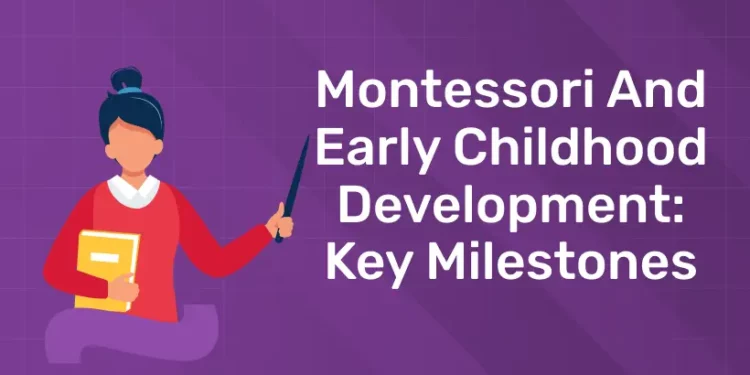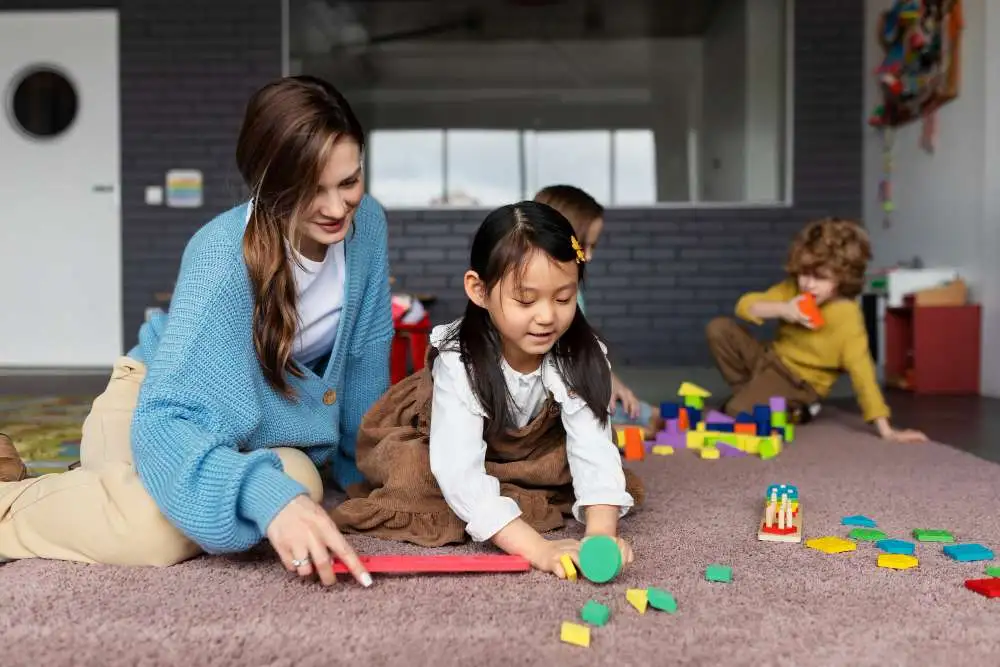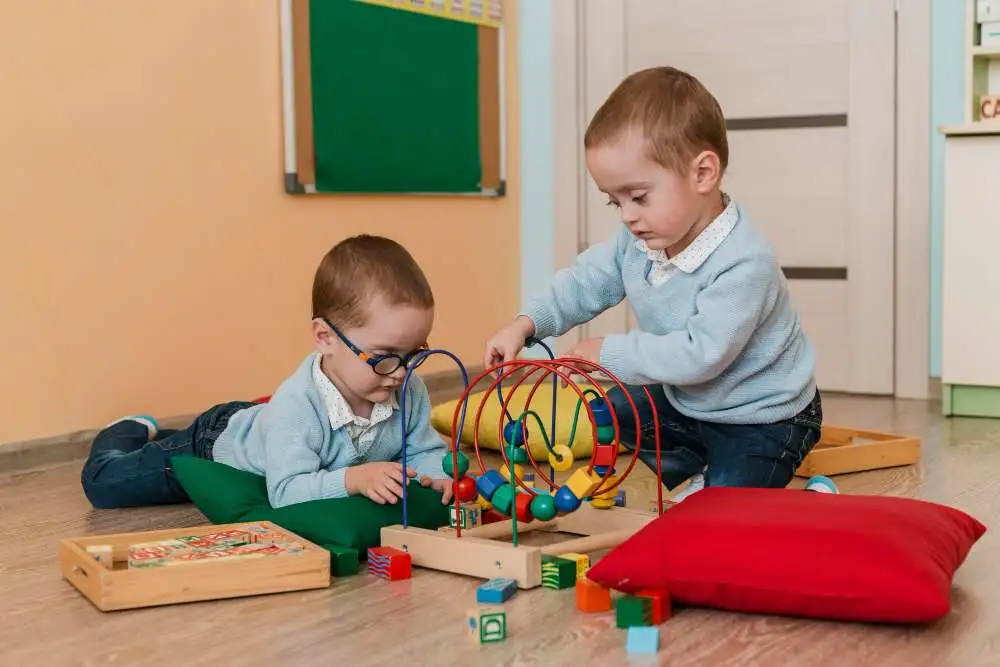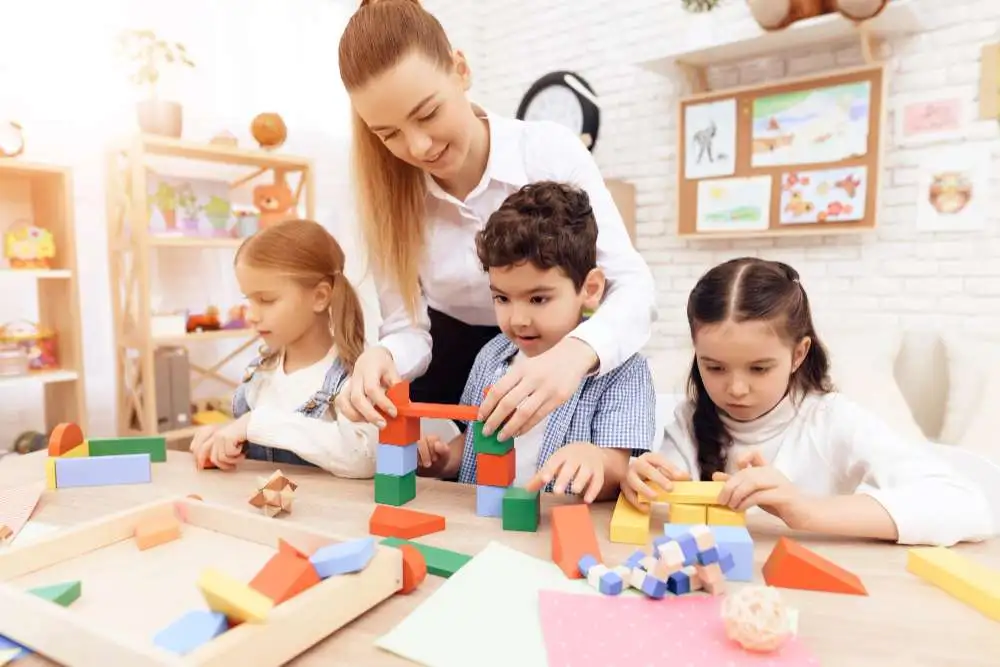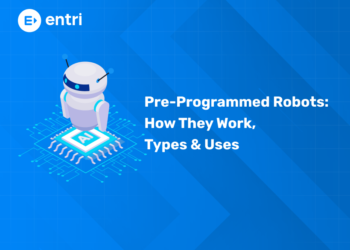Table of Contents
Early childhood is a time of rapid growth. From the first smile to the first sentences, children are laying the cognitive, social and motor foundations for the rest of their lives. The Montessori approach, with its emphasis on observation, independence and prepared environments, fits perfectly into those early years. It gives clear, practical ways for parents and Montessori teachers to identify milestones and design experiences that honour each child’s pace.
This guide is for everyday parents and Montessori professionals. It explains the key milestones, links them to Montessori materials and practices and gives you actionable strategies to use in the classroom or at home.
Why Montessori aligns so well with early development
Maria Montessori observed children for decades and developed a method based on what she saw: children learn best in environments that are orderly, sensory-rich, and allow freedom within limits. Three core Montessori ideas are especially relevant for early development:
- Sensitive periods, predictable windows when a child is particularly receptive to certain skills (language, movement, order).
- Prepared environment, spaces and materials designed to invite independent exploration and learning.
- Auto-education, the belief that children learn best by doing; the teacher’s role is primarily observational and facilitative.
When teachers and parents align activities with these ideas, learning becomes joyful, efficient and deeply embedded.
Start your journey to becoming a certified Montessori teacher! Get free Demo Here!
Developmental stages and Montessori practice: an overview
1: What is the primary focus of the first plane of development in the Montessori method?
For practical clarity, we’ll group early development into three Montessori-friendly stages:
- Birth to 3 years (Absorbent Mind , early sensorial and practical life foundations)
- 3 to 6 years (Language explosion, refinement of motor skills, early academic foundations)
- 6 to 9 years (Reasoning, imagination, social construction and cultural studies)
Below, each stage includes key milestones, Montessori materials/activities that support them, and tips for observation and assessment.
Get Certified & Start Your Montessori Career
Montessori Teacher Training Course by Entri App: Gain expert skills, earn certification, and kickstart your teaching career.
Join Now!The Absorbent Mind: From Birth to 3 Years – Movement, Sensorial Foundations and Practical Life
Key Moments to Look Out For (Typical Range)
- Gross Motor: You’ll probably notice your baby starting to gain control over their head (0–3 months), then rolling over (3–6 months), and before you know it they’re sitting up (6–9 months), crawling (6–10 months), standing and taking their first wobbly steps (9–18 months).
- Fine Motor: Around 8-12 months, they’ll likely start to reach and grasp, then develop a pincer grasp for those tiny fingers. And don’t be surprised if they can stack two blocks together by the time they’re 12-18 months old.
- Language: Young babies start cooing and babbling (0–6 months), then say their first words (9–15 months), and before you know it, they’re stringing two words together (18–24 months).
- Social-Emotional: They might smile at you (6–8 weeks), become attached to you (6–12 months), and start showing interest in playing alongside others (18–24 months).
- Sensorial: They’re constantly exploring textures, shapes, sounds and tastes and getting an early start on appreciating order and routine.
Montessori Support & Materials for this Age Group
- Practical Life: You’ll want to set up low shelves for choosing toys, lots of child-sized pouring sets and big buttons and zips on dressing frames to help with fine motor skills, sequence memory and independence.
- Sensorial: Don’t be afraid to introduce simple tactile boards, contrasting fabrics, sound cylinders and visual mobiles to help refine their discrimination of all sorts of things.
- Movement: Just give them space to move – set up a rug, some low obstacles for crawling, and a few safe pieces of furniture to pull up onto. Never push them to hit a milestone if they’re not ready – just keep offering opportunities.
Teaching Tips & Observation
- Use those short observational notes: time of day, mood, task attempted, level of independence. Montessori teachers jot down little anecdotes that reveal patterns – like a child’s love of order.
- Routines, routines, routines – Young children thrive on knowing what’s coming next, so keep your mealtimes and naps consistent.
- Language: Try narrating your actions – “Now we’re pouring water” rather than quizzing them. Kids absorb vocabulary through rich, meaningful situations.
3 to 6 Years – Language Takes Off, Concentration Grows, and Skills Refine
Key Milestones to Watch Out For (Typical Range)
- Gross Motor: You’ll see their balance get better and better, and they’ll start hopping and skipping around.
- Fine Motor: They’ll be using scissors, drawing some pretty decent shapes and tying their laces by the end of this stage – wow!
- Language: That vocabulary is going to just take off – they’ll be stringing together long sentences and getting into imaginative play. Some kids will even start reading simple stories.
- Cognitive: They’ll be getting better at sorting, sequencing and understanding cause-and-effect. They might even be able to work on one activity for a chunk of time (20-45 minutes!).
- Social-Emotional: Watch them start to share and take turns, play out stories and show some real empathy towards others.
Montessori support and materials
- Practical life: refined tasks like cutting vegetables, polishing, table washing , these foster independence and attention to detail.
- Sensorial: Pink Tower, Brown Stair, Colour Tablets , these classic materials refine visual discrimination, size, and dimension perception.
- Language & literacy: sandpaper letters, movable alphabet, object-picture matching, storytelling rugs. These build phonemic awareness and early reading skills in a tactile way.
- Mathematics: number rods, spindle boxes, and bead materials that make abstract quantities concrete.
- Grace & courtesy: role play and classroom routines teach social expectations.
Teaching tips & assessment
- Allow uninterrupted work cycles (ideally 2–3 hours in an authentic Montessori classroom). Concentration is a formative skill , protect it.
- Observe for sensitive periods: children may show a phase of intense interest in letters or numbers; gently provide appropriate materials.
- Encourage narration and reflective questions: “What did you notice?” rather than corrective feedback.
6 to 9 years , reasoning, cultural awareness and social construction
Key milestones (typical range)
- Cognitive: logical thinking develops, improved problem-solving, beginning grasp of abstract concepts.
- Language: more complex syntax, greater vocabulary, creative and expository writing emerge.
- Social-emotional: cooperative group work, leadership roles, moral reasoning and perspective taking.
- Academic: transition from concrete to abstract mathematics, reading fluency, scientific curiosity.
Montessori support and materials
- Cosmic education: Montessori’s “cosmic” lessons introduce children to broad, interdisciplinary themes , astronomy, geography, history , encouraging wonder and moral responsibility.
- Advanced math: fraction material, squared paper, and decimal materials help bridge concrete understanding to abstract numeracy.
- Language arts: creative writing prompts, grammar symbols, research projects and presentations.
- Practical projects: gardening, cooking, simple carpentry and classroom businesses teach responsibility and real-world skills.
Teaching tips & assessment
- Promote project-based learning: multi-week investigations that result in a presentation develop planning and executive function.
- Use portfolios to document progress: samples of writing, maths work, science notebooks and photographs of project stages.
- Encourage peer teaching, children consolidate knowledge by explaining concepts to others.
Get Certified & Start Your Montessori Career
Montessori Teacher Training Course by Entri App: Gain expert skills, earn certification, and kickstart your teaching career.
Join Now!Sensitive periods and what to watch for
Montessori identified windows of opportunity, sensitive periods, when certain abilities develop rapidly.
- Language (birth to ~6 years): Rich oral language environment and exposure to vocabulary matters more than formal instruction.
- Order (first three years): Young children prefer predictable environments; disorder can be unsettling.
- Refinement of the senses (0–5 years): Repeated sensorial activities sharpen discrimination skills.
- Movement (0–5 years): Freedom to move builds brain-body integration.
When children show intense interest (e.g., persistently arranging objects), the prepared environment should offer appropriate materials to support that sensitivity, rather than interrupting or redirecting it.
Observation, documentation and assessment in Montessori practice
Montessori assessment is formative, based on close observation rather than standardised tests.
Practical systems include:
- Anecdotal records – brief stories telling what a kid did, when and how much independence they used in the process.
- Checklists – used sparingly for identifying emerging skills. We don’t want to overdo it, though.
- Work samples & portfolios – collections of all sorts of stuff they’re made and doing, like drawings, writing, math projects, and photos of them working on things.
- Parent-teacher chats: Share what you’re seeing with parents, and work together to figure out what comes next.
Adapting Montessori locally:
Montessori is universal, but local culture, geography and language shape practice:
- Materials: source local, natural materials when possible, wooden utensils, regionally made toys and culturally relevant storybooks.
- Language: teach in the child’s home language while gradually introducing additional languages where appropriate.
- Food and routines: integrate local meal patterns and festivals into sensorial and cultural lessons.
- Community links: gardening projects, local history walks and visits to markets help children connect learning to their immediate environment.
For teachers in cities like Mumbai, Bangalore, Delhi, Kochi or Chennai, this means marrying Montessori structure with local rhythms , whether that’s siesta time in some climates, monsoon-based activities, or local festival preparations.
Start your journey to becoming a certified Montessori teacher! Get free Demo Here!
Why professional training matters, the role of a Montessori TTC
High-quality Montessori practice depends on skilled adults who can observe, sequence materials, and prepare environments. A recognised Montessori Teacher Training Course (TTC) offers:
- Deep study of Montessori philosophy and child development.
- Practical “on-the-mat” practicum hours in real classrooms.
- Training in material presentation, lesson pacing and observation techniques.
- Safety, inclusion and classroom management strategies.
- Guidance on parent communication and classroom leadership.
If you’re interested in a structured path that blends theory with practice, Entri’s Montessori TTC provides grounded training designed to prepare teachers for modern classrooms. Their course typically covers child development, material mastery and practical teaching hours , all essential for confident, ethical practice.
Practical classroom sequences & sample activities
Here are sample activities you can use in a 3–6 Montessori classroom to address multiple milestones:
Morning routine (arrival)
- Practical life: children hang their bags, pour a drink, polish a tray. This invites independence and calms transition energy.
Focused work cycle (60–90 minutes)
- Sensorial: colour tablets or sound boxes for 15–20 minutes.
- Language: sandpaper letters or phonetic exercises for 15 minutes.
- Maths: number rods or spindle box for 15–20 minutes.
- Cultural: short story or geography map exploration for 10–15 minutes.
Group time (short)
- Circle for calendar, songs, or a short story. Keep group moments brief and meaningful.
Outdoor & gross motor
- Free play, balance beams, obstacle courses and gardening.
Closing
- Children restore materials and reflect: “What did you do today?” This builds metacognition.
Key takeaways
- Montessori maps naturally to early childhood development through sensitive periods, prepared environments and hands-on materials.
- Development unfolds in predictable stages (0–3, 3–6, 6–9), each with physical, cognitive, language and social-emotional milestones.
- Observation is the teacher’s most powerful tool; documentation should be formative, respectful and practical.
- Prepared environments and practical life activities build independence, concentration and self-discipline.
- Montessori is adaptable: use local materials, respect cultural rhythms and collaborate with families.
- Professional training (a Montessori TTC) equips teachers with the knowledge, practicum experience and ethical frameworks to support children effectively.
Final thoughts
Montessori is more than a set of materials; it’s a way of seeing childhood. When teachers and parents attend to the child’s sensitive periods, prepare the environment and observe, learning becomes a natural, fun process. Whether you are a parent wanting to support your toddler’s first words or a teacher preparing older children for group work, the Montessori principles here will give you a practical guide.
Ready to go deeper and step into the classroom as a confident Montessori guide? Consider a professional Montessori Teacher Training Course. A well-structured TTC like Entri’s Montessori TTC will give you the theory, practicum and community support to make a real difference to young lives.
Get Certified & Start Your Montessori Career
Montessori Teacher Training Course by Entri App: Gain expert skills, earn certification, and kickstart your teaching career.
Join Now!Frequently Asked Questions
How does the Montessori method support early childhood development?
The Montessori approach facilitates the development of young children by offering a ready-made setting in which they can explore and learn at their own speed. Through practical exercises and resources, it focuses on important developmental stages such as sensory, linguistic, social, cognitive, and physical development.
What role do sensory activities play in Montessori education?
Montessori education relies heavily on sensory activities since they aid in children’s understanding and categorization of their surroundings. Sorting, matching, and investigating textures and noises are examples of activities that stimulate children’s senses and set the stage for later, more sophisticated learning.
In what ways does a Montessori education promote self-reliance?
Montessori education encourages children to complete activities independently, which promotes independence. Children are encouraged to select activities that pique their interest in the classroom setting, which fosters confidence and self-discipline. Teachers let kids learn via experience rather than by giving them instructions.
How can parents support Montessori principles at home?
Parents can effectively implement the concepts of Montessori education by fostering a setting that encourages independence, curiosity, exploration, hands-on learning, and self-discipline.
How much structure is too much?
Structure in the prepared environment is purposeful , materials are organised, but children choose. Avoid over-scheduling; allow long, uninterrupted work cycles.


